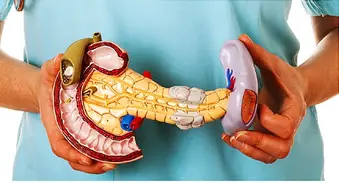How Well Do You Know Your Pancreas?


Question 1/12
What does your pancreas do?
- Gets rid of solid waste from the body
- Breaks down nutrients and makes hormones
- Creates energy
Question 2/12
Where is the pancreas located?
- Behind the stomach
- Above your liver
- Between the small intestine and large intestine
Question 3/12
What does your pancreas make?
- Enzymes
- Carbohydrates
- Muscle
Question 4/12
You can live without a pancreas.
- True
- False
Question 5/12
The pancreas can attack itself.
- True
- False
Question 6/12
What is the most common cause of chronic pancreatitis?
- Smoking
- Drinking
- IV drug use
Question 7/12
Every day, your pancreas releases about how much enzymes?
- Two cups
- A gallon
- About a liter
Question 8/12
What cells in the pancreas make insulin?
- Germ cells
- Islet cells
- Epithelial cells
Question 9/12
Type 1 diabetes is caused by:
- An immune system reaction
- Smoking
- Too much sugar
Question 10/12
How many people in the U.S. develop pancreatic cancer each year?
- About 25,000
- About 44,000
- About 75,000
Question 11/12
Can you get a pancreas transplant?
- Yes
- No
Question 12/12
The pancreas can detect what kind of taste?
- Sweet
- Salty
- Sour